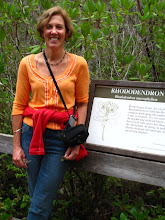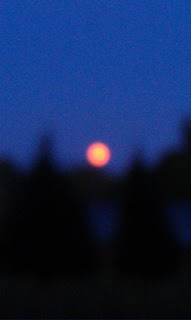Smack! My tail bone hit first. CR-R-ACK! A thundershot, as my head flew back and bounced off the wooden court floor. Hmmm, I thought, lying there. That smarts.
"Are you okay?" Juan the Gardener asked, peering down. "That was a nasty sound."
"I don't know," I said.
Then I grunted, "Ice."
"Ice?"
"Ice."
I moved parts of my body incrementally. Other than a wicked headache, everything seemed okay. Sore. Juan came back with a plastic bag filled with ice. I sat up slowly and held the ice to the back of my head.
"Do you think you can finish the game?" Juan asked, half grinning. He had been winning.
"Absolutely not."
For the next few days I just wanted to lie on the living room couch and be still. Light seemed to pierce my eyeballs, and I couldn't concentrate enough to read more than a sentence. I slept. The headache intensified. Finally, the two of us looked up the symptoms of concussion.
I don't know why, but whenever I am sick or injured I have a hard time believing it. I need hard evidence. Sensitivity to light and noise. Check. Headache. Check. Confusion or feeling as if in a fog. Check. Fatigue. Check.
"I think you should go to the hospital," Juan the Gardener said.
"Okay." My mother had pitched face first onto the floor recently and had sustained a tiny bleed in the brain. It made sense to check it out. I still felt a vague sense of guilt, as if I were wasting someone's time.
"Or, we could wait until after the Red Sox play and go this afternoon," he teased.
I had a CT scan and some x-rays of my lower spine, and it was determined that I had sustained a concussion and cracked the tail bone.
"You need to rest both your body and your mind," the friendly ER nurse explained. "The symptoms could last for weeks."
I actually did as I was told. I lay on the couch, my feet propped on a pillow. I listened to a CD called Radical Acceptance: Guided Meditations by Tara Brach. I read selections from Wherever You Go, There You Are by John Kabat-Zinn. I skimmed a forgettable novel. I stared into my phone at the changing expressions on my new baby grandson's face. I slept. Other than occasional forays out to the garden to pull a weed or two, I mostly did nothing.
Juan the Gardener cooked, and treated me with great gentleness. As I rested, I began to feel drifty, as if rising and falling on draughts of air that breezed in through the screen, and then, surprisingly happy. A touch of bliss. Without the driving lash of my thoughts exhorting me to get up get going get moving get doing, I began to relax completely. The present moment, foggy and out of focus though it was, was where I resided. What arose, as they say, was appreciation.
I began to suspect I had brain damage.
"I really like you like this," Juan the Gardener commented. "I mean, of course I love all of you," he hastened to add. "But," he wondered with his usual sense of tact, "Do you think you'll come back?"
He meant the compulsive, obsessional me whose nose wrinkles in disgust when ant scouts scurry across the counter tops, or the me that washes our sheets every two days; the me that ferrets out sources of complaint.
"I don't know," I said.
*
"No, you don't have brain damage," my learned friend (well, okay, he's my therapist) Andy laughed.
"No, I don't think you have a brain tumor either."
He didn't even think the concussion accounted for my unfamiliar state of mind.
"You mean I feel like this because I succumbed to being concussed?" I asked.
Yes, he did.
I pondered how it had happened that about a year ago, a proverbial portal had opened and I had been guided to a therapist who wanted me to focus on the present moment, upon perception and sensation, rather than the past.
The moment, to paraphrase Kabat-Zinn, as it blooms.
The moment, to paraphrase Kabat-Zinn, as it blooms.
How strange that the past few years of practicing meditation, and reading some dharma and engaging in long philosophical discussions with Juan the Gardener and listening to Buddhist teachers should lead me to this.
Bouncing my head off the racquetball court did cause me to stop. I ceased struggling against life - my life. Stopped battling and scrambling. I surrendered. What I found in my mind's foggy corridors was peace - moment upon moment.
It's not if the struggle resumes, it's clearly when. I like floating in my cirrus-filled thoughts. But, I do have a point of reference: a comfy couch in a sun filled room, a vase of flowers, luminous light bouncing off cream-colored walls, birdsong, humming insects, my grandson's beautiful face, Juan the Gardener checking in, kissing the top of my head.
It's not if the struggle resumes, it's clearly when. I like floating in my cirrus-filled thoughts. But, I do have a point of reference: a comfy couch in a sun filled room, a vase of flowers, luminous light bouncing off cream-colored walls, birdsong, humming insects, my grandson's beautiful face, Juan the Gardener checking in, kissing the top of my head.











